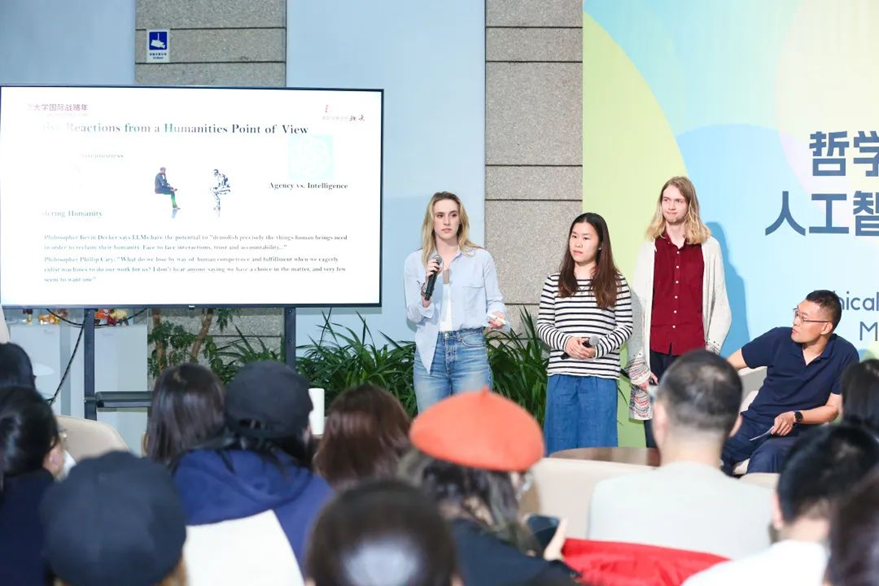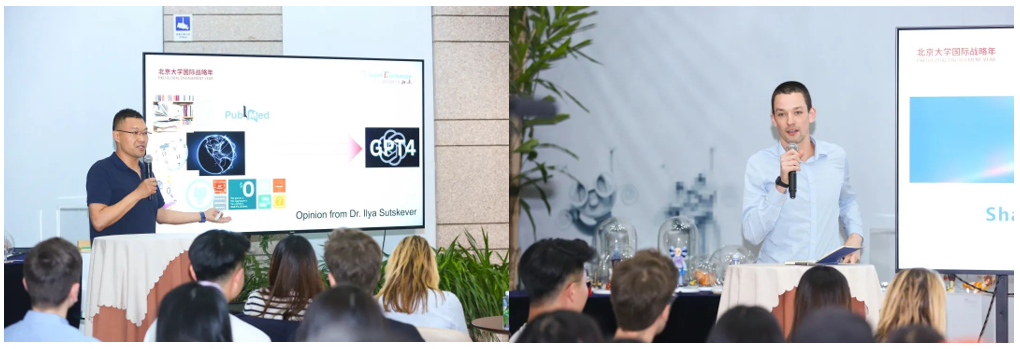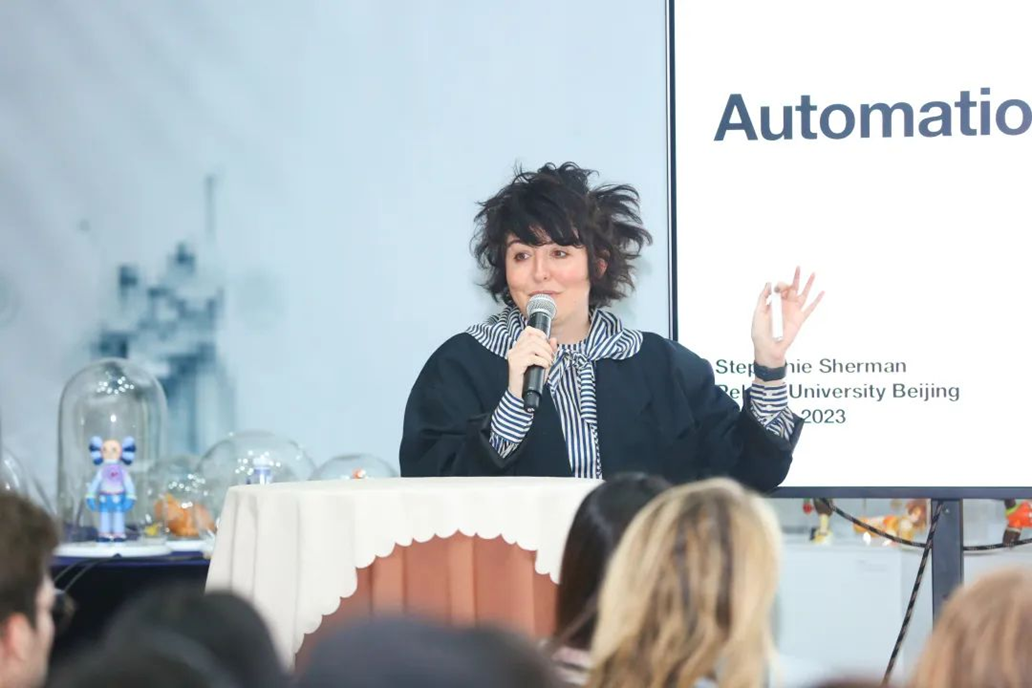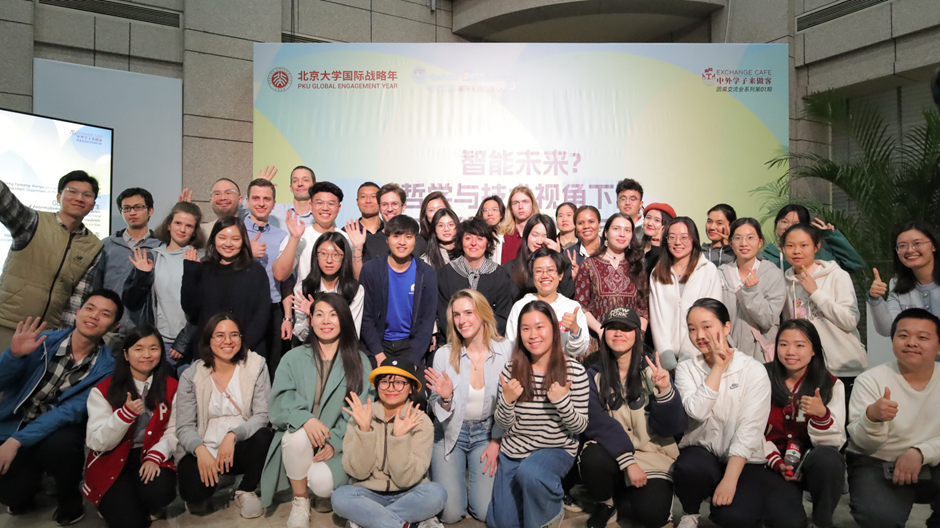Editor’s note: As part of the endeavor to promote PKU's Global Engagement Year, the International Students Division launched the Exchange@PKU initiative to enhance the experience of international exchange students at PKU. The Exchange Cafe is introduced as a new platform to encourage conversations among international exchange students, and PKU students and professors. PKU professors take up the role of hosts, inviting students to discuss intriguing and heated topics in a non-classroom setting. The first edition of the Exchange Cafe drills down on ChatGPT, among other AI-powered language models created to hold a conversation with the end user.
Peking University, May 3, 2023: Late last year, an application was launched rather unassumingly. Within a few weeks, mass media begin to catch on and the app became a worldwide phenomenon. Today, ChatGPT has become a word in our everyday vocabulary, with similar technologies being rolled out to compete in this emerging market. This buzz has reached Peking University, as a group of professors and students gathered in an unconventional setting to discuss this unprecedented development in technology.
On April 27, 2023, professors Feng Yansong, from Wangxuan Institute of Computer Technology, and Julius Schoenherr, from the Department of Philosophy and Religious Studies, inaugurated the first issue of The Exchange Cafe. Together with Stephanie Sherman, Director of MA Narrative Environments at the University of Arts London and Associate Director of Antikythera at Berggruen Institute, as well as six international exchange and local students, they shed light on the future of large language models (LLMs) and their impacts on humanity.
The session began with a sharing by Professor Sherman on the history of technology. Titled “Automation: Trajectories of Technological Transformation,” her sharing placed current developments in LLMs into the larger historical process of automation. Automation is a relative process of generalization, which frees up humans from prior mechanical responsibilities to undertake more creative ones. Automation is the process of outsourcing tasks to non-human entities, which transforms humans as a result. Speculative design is required to maximize good uses and account for unexpected consequences of technologies developed through the process of automation. In response to recent developments in LLMs, narratives have lost their human-exclusive nature, prompting a new perspective of alignment: humans ought not to be concerned with governing technology, but instead include new technologies into a novel notion of governance.
Professor Sherman introducing the history of technology
Next, students from various disciplines presented on LLM’s current usage, impacts and reception. Exchange students Nikolai and Joe from the Technical University of Munich briefly explained how LLMs work by incorporating real-life examples. Broadly, LLMs model neural networks in the human brain, and learn through labelling and classification to predict the next response. Liu Xiao, a doctoral student from PKU School of Intelligence Science and Technology, elaborated that the success of LLMs lies not in their model, but their processing ability that surpasses humans’, while warning about the black-box problem and efforts by Chinese firms in response. Handing the baton to students from social sciences and the arts, Noa and Madison, exchange students from York University and the University of Notre Dame respectively, shed light on positive and negative responses in academia towards LLMs. Later, Jiang Fanyi, an undergraduate at PKU Philosophy Department, recounted examples of practical steps universities and countries have taken against LLMs, reflecting the depth of the technology's impact on education and human society at large.

Case illustration
Prof. Feng summarized the students’ presentation, sieving out LLM’s fundamental aim to predict the next word. He provided food for thought concerning reliability, safety and copyright issues of LLMs, particularly of a future of contents generated, at least partially, by AI. Reflecting on the aforementioned issues, Prof. Schoenherr used a thought experiment of asserting a lottery ticket is a losing ticket to show the absurdity therein, suggesting that knowledge, not probability, as the requirement for assertion. This has implications for algorithms, prompting us to rethink the bases on which we trust the information it provides. He further differentiates between creation and checking, identifying the former as a reflection of true understanding, in the meantime questioning whether machines are capable of that.

After a short intermission, the session continued with a dialogue on three subtopics, including practical implications of LLMs’ infiltration into education for educators and students, and how to deal with untrue information presented. Having heard concerns regarding LLMs, Sherman offered an alternate perspective: think back to when Wikipedia was first introduced; it was erroneous yet intriguing, but today an integral part of the worldwide web. Will LLMs follow suit, as a process of normalization? Deeper topics of consciousness and emotions in machines ensued, and concerns about mistaking self-consciousness for consciousness were raised.
Dialogue section
In the closing Q&A segment, the audience posed questions clarifying the role of AI in human decision-making, the goals of AI in relation to humanity, as well as practical concerns in the job market and academia.
After the Exchange Cafe, many students who attended shared their insightful ideas and valuable takeaways with us. They engaged in thoughtful discussions and exchanged views on various aspects of LLMs, including their historical development, training models, and potential implications for copyright and ownership issues. Some students also expressed their curiosity and interest in exploring the use of LLMs in different fields, such as business, healthcare, and education. Here we have handpicked several comments.
The Exchange Cafe has allowed me to gain a great deal of knowledge about LLMs. I find Prof. Sherman's sharing particularly insightful, enabling me to understand LLM through its historical development. The students shared about LLM's training model in an interactive manner which was easy to comprehend. The event has made me aware of many knowledge gaps that are not commonly mentioned, and piqued my interest about copyright and ownership issues revolving around LLMs. I hope that there will be many more similar events in the future!
Eugene Ong, School of Economics
The Exchange Cafe was very informative and fascinating. I learned that one of the key advantages of LLMs is their ability to learn and adapt over time. This means that as more data is fed into the system, the model becomes more accurate and effective at performing its designated tasks. This can have important implications for businesses and industries, as it allows for more efficient and effective decision-making processes. However, there may be concerns about the potential for biases to be embedded in the machine learning algorithms, which could have negative impacts on certain groups or individuals. It is important to be aware of these issues and to engage in thoughtful discussion and analysis of their potential impacts on society and the economy. I am eagerly anticipating the opportunity to engage in further discussions with exchange students on a wide range of topics.
Jin Chuchu, School of Economics
I’m very glad to be a part of this amazing event. We’ve spent a lot of time brainstorming and preparing for the event together with the exchange students, and this opportunity to work together on an interdisciplinary topic where everybody has something to offer really gave me new insights. We’ve also come to know more about each other, including our diverse cultural backgrounds, during the process. Big thanks to everyone for making this happen!
Jiang Fanyi, Department of Philosophy and Religious Studies
I thought the event was very informative. It helped to defuse or take away our negative views or our biases about artificial intelligence. Considering the most impressive parts, I really enjoyed the part of the exchange students when they were explaining exactly their viewpoints on AI. I thought that they kind of simplified it for us in a way that we could grasp and understand it. So I really appreciate that, and I like to see fellow students who are passionate about the areas of the fields that they're studying.
Ripuree Tjitendero, School of International Studies
Group photo
Written by: Jin Chuchu, Cheong Jia Yun Brenda
Interviewed by: Luo Yushan, Wu Xiaotong
Edited by: Dennis Meng




